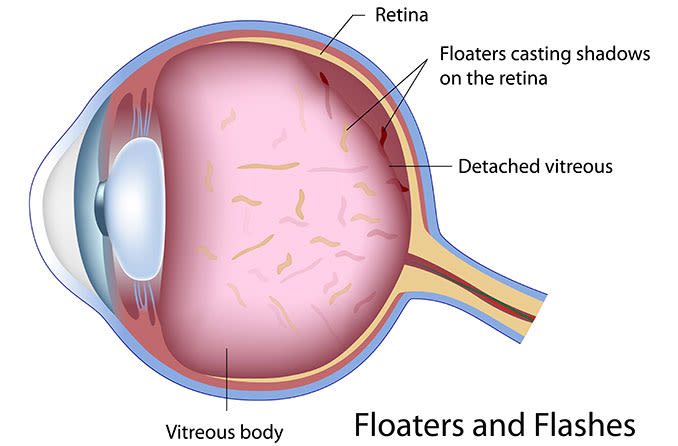Eye floaters and flashes: Likely causes

Those who have dealt with eye floaters understand how distracting the condition can be. Having your vision interrupted by spots, web-like strings or light flashes is enough to test even the strongest patience.
So, what causes these little annoyances to drift across your vision? While floaters may look like they are drifting in front of your eyes, they actually are caused by something going on inside of the eyes.
Read more to get the details behind the natural aging process of the eye, and how it can lead to floaters and flashes in your vision.
Vitreous of the eye: The basics
The vitreous is a gel-like substance, made up of water and tiny fibers of a protein called collagen, that maintains the round shape of your eyeballs. According to the National Eye Institute, there are millions of tiny collagen fibers floating around within the vitreous that are attached to the retina.
The vitreous membrane is a thin layer of collagen that works like a protective sack to keep the vitreous separated from the rest of the eye. As you age, the gel-like vitreous liquifies — a process known as vitreous syneresis — and has the potential to cause problems like eye floaters, flashes and shadows.
What causes eye floaters
Eye floaters typically occur as a result of vitreous syneresis. The process begins in the center of the vitreous, so while the middle may be liquified, there are still thicker, collagen-filled parts around the edge of the membrane.
As the center of the vitreous liquifies, it causes bits of collagen attached to the retina to tear off or disconnect. This is known as vitreous separation or vitreous detachment and, while it sounds alarming, does not threaten your vision.
Once detached, the bits of collagen will float around in the (now liquid) vitreous. The shadows cast on the retina by these collagen bits when light enters the eye are what your brain perceives as floaters drifting in front of your eyes.
Other age-related changes in the vitreous cause small bits of collagen to clump together. This is what gives floaters their irregular shape — like those small “pilling” fibers you might pull off a knit sweater.
SEE RELATED: Types of eye floaters
Cause of eye flashes
Flashes of light can be seen anywhere in your field of vision, but the source, like eye floaters, is something happening inside your eyes.
The retina is a very light-sensitive part of the eye. As mentioned earlier, the vitreous contains collagen that is attached to the retina. When those collagen fibers tug on the retina, it can trigger a response within the eye that produces a flash of light.
These flashes are caused by traction (tugging) on the retina that can potentially lead to a tear of detachment of the retina, which can cause permanent vision loss.
Though most eye flashes are harmless, if you suddenly experience persistent flashes of light — especially if they are accompanied by a sudden and significant increase in floaters or a shadow forming in part of your field of view — see an eye doctor immediately to rule out a torn or detached retina.
SEE RELATED: Eye floater and flashes: What's the difference?
When to see a doctor
Eye floaters and flashes caused by aging changes in the vitreous or a vitreous detachment do not typically put your sight in jeopardy. In fact, more often than not eye floaters go away on their own.
But in some cases, traction on the retina from the vitreous liquefying and pulling away from it can lead to a tear in the retina, a retinal detachment or a hole in the macula (the most sensitive spot in the center of the retina).
Retinal detachment and macular holes are certainly a threat to your sight, causing permanent vision loss if not treated quickly. If you notice that the presence of floaters, flashes or shadows has increased, even slightly, it’s vital that you see an eye doctor.
During a comprehensive exam, the eye doctor will dilate your pupils and examine the retina to make sure no tears or detachments are present. If they do see something worrying, they will establish early treatment to help prevent permanent vision loss.
READ MORE: Eye floaters treatment
Page published on Thursday, October 8, 2020




